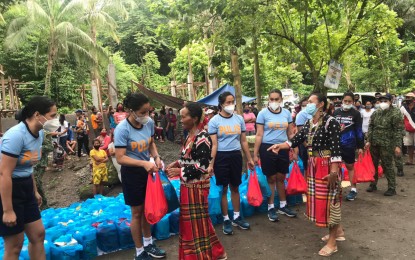
IMPROVED. Women members of the Blaan tribe of Sitio Nopol, Barangay Mabuhay in General Santos City receive gifts from police personnel in an outreach activity in December last year. Datu Fulong Dan Alim, Blaan tribal chieftain, said the situation in their village, which suffered from years of poverty and neglect, has vastly improved in the last two years due to interventions facilitated by the National Task Force to End Local Communist Armed Conflict. (PNA GenSan file photo)
GENERAL SANTOS CITY – A tribal community here is starting to break off from long years of poverty and neglect as more government services are finally reaching the area through the convergence efforts of various agencies.
Datu Fulong Dan Alim, Blaan tribal chieftain and head of the Indigenous People’s Alliance Movement, said Friday their community in Barangay Mabuhay has already been reaping the gains of various projects implemented in the last two years by facilitated by the National Task Force to End Local Communist Armed Conflict (NTF-ELCAC).
He said these include the construction of a farm-to-market road and implementation of community-based infrastructure as well as livelihood projects.
Alim, in an interview with Presidential Communications Operations Office Secretary Martin Andanar over the weekly “Cabinet Report,” said their village was once a problematic area due to the inaccessible roads and the lack of livelihood opportunities for residents.
He said the situation was difficult for local residents, especially members of the Blaan tribe, who became targets for recruitment by the Communist Party of the Philippines - New People’s Army (CPP-NPA).
“We grew up in that situation. Although our village was spared from the armed conflicts, some members of our tribe were lured into joining the NPA while others became part of their masa (sympathizers),” he said.
The CPP-NPA is listed as a terrorist organization by the United States, European Union, the United Kingdom, Australia, Canada, New Zealand, and the Philippines.

Vast improvement
Alim, however, said the condition in their village, which is about 12 kilometers away from the city proper, has vastly improved since last year as government interventions poured in through the convergence initiatives of various agencies.
These were under the government’s “whole-of-nation” approach addressing the local communist armed conflict pursuant to Executive Order No. 70 signed by President Rodrigo R. Duterte in 2018.
Among the realized projects was the nearly seven-kilometer farm-to-market road that now connects farm areas in Barangay Mabuhay, among them their community in Sitio Nopol, to the local markets.
The road traverses “very productive” farm areas in their village but their potentials were not realized these past years due to the poor road condition, especially during the rainy season, he said.
The roads leading to their village, he added, are usually flooded after a heavy downpour and they practically transform into “water highways.”
Alim said the Department of Agriculture has approved a proposal to include their village as an expansion area in the region of a dairy production project being implemented by the National Dairy Authority.
The agency, he said, allotted an initial 100 dairy goats for them in the next batch of imported stocks that will be arriving next year.
Their village has vast areas which include the tribe’s ancestral domain that can be utilized for the project.
Gainful livelihood
Under the program, he said the milk production of the farmer-beneficiaries will be purchased by government agencies, especially the Department of Education and the Department of Social Welfare and Development, to sustain their feeding programs.
“This will be an opportunity for members of our tribe to have a gainful livelihood and at the same time support the national feeding program,” he said, citing Republic Act 11037 or the “Masustansyang Pagkain para sa Batang Pilipino Act.”
Aside from this, Alim said the National Commission on Indigenous Peoples, through Commissioner Jennifer Pia Sibug-Las, facilitated the installation of water pumps in upland portions of their village.
He said these projects addressed the need for sustainable water resources for their residents, including farmers.
The city government, on the other hand, helped address their tribe’s need to properly practice and preserve their customs and traditions, as well as maintain their identity, through the establishment of a “Kasfala” Hall, a gathering or meeting place for tribal residents to settle conflicts and address other related concerns, at the local government center area.
They are currently working with the barangay council of Mabuhay for the establishment of a trading post in their village, he added.
He said the facility will consolidate the products of local farmers and serve as a venue to establish linkage with traders that could eventually ship them to Metro Manila and other major markets.
Through the Department of Trade and Industry, he said, they could later process their products, package and ship them to bigger markets.
“With these developments, members of our tribe have no reason any more to be duped by the NPA. Our lives are getting better and our children are assured of a brighter future,” he said. (PNA)
